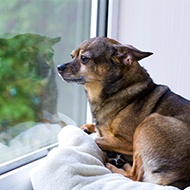
Survey highlights pet owner concerns about COVID-19 restrictions lifting.
More than a third of pet owners in the UK (35 per cent) are worried about leaving their pets alone as COVID-19 restrictions lift, according to a recent survey by Burgess Pet Care.
Of the 1,500 responses, 30 per cent of owners noted a change in their pet’s behaviour during the three lockdowns, with 40 per cent noticing changes in their pet’s normal routine.
The pet food manufacturer’s survey also found that 70 per cent of pet owners spent more time with their pets during lockdown. However, just 29 per cent have taken steps to prepare their pet for being left alone.
Dr Suzanne Moyes, veterinary director at Burgess Pet Care, has called on pet owners to think about how the lifting of cornavirus restrictions will impact their animals.
“Separation anxiety in dogs is a recognised and well-documented condition, with symptoms including pacing, panting and chewing items that smell of their owners,” she said.
“However, it’s also important to recognise that for some cats, their world revolves around their human and a sudden increase in time without human company may result in them displaying signs of separation anxiety including over-grooming, starting to spray around the house and an increase in meowing for attention."
Perhaps more reassuringly, the survey found that 33 per cent of pet owners are already thinking about life after lockdown and intend to prepare their pets for this scenario. Dr Moyes urged owners worried about their pets to introduce strategies to help them as soon as possible.
“There are lots of things you can do to make the transition easier for your pet,” she continued. “For dog owners, try a long-lasting treat or puzzle toy, and gradually increase the amount of time you leave them alone. For cats, try praising and rewarding them with a small treat when they’re resting in another room or when they stop meowing for attention.”



 The latest
The latest